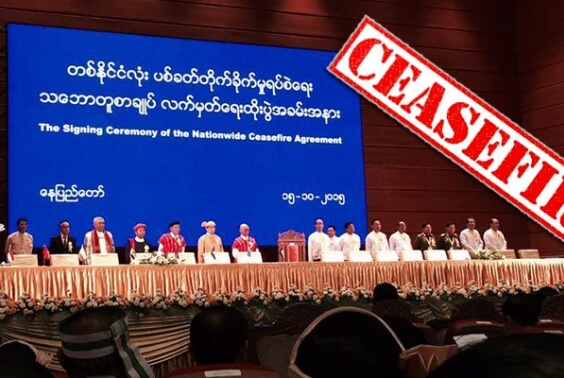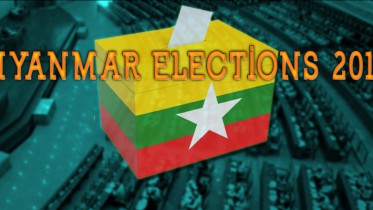- MYANMAR
The private sector, peace-building and the international anti-corruption agenda

Three years ago a leading international company approached Control Risks to seek advice on a proposed investment in an African country that—all being well—is in the process of recovering from a debilitating series of internal conflicts. There was little question about the commercial opportunities. Our role as consultants was to advise on political, security and integrity risks.
The central question concerned corruption. Our client’s senior executives were confident that they could obtain a license without paying a bribe. However, they were uncertain whether they could actually run their business without being ground down by multiple day-to-day and week-by-week demands for smaller ‘operational bribes’ in order to ensure the smooth running of their businesses. If they succumbed to these demands, they feared that they would be vulnerable to prosecution under their home country’s extra-territorial anti-corruption laws. Ultimately, we were unable to resolve their concerns. Our client’s business development managers were keen to pursue the investment, but their lawyers were much more wary. The investment has not gone ahead.
This episode highlights the relationship—and the potential for tension—between two key policy objectives:
- ・Equitable economic development is an essential requirement for peacebuilding in post-conflict recovery. This will not happen without the active participation of the private sector.
- ・Good governance is likewise essential both to prevent abuses by predatory private sector actors, and to create the conditions where honest companies can compete fairly. The prevention of corruption is a vital part of the governance agenda.
The tensions concern timing and practical decision-making. As the 2011 World Bank World Development Report pointed out, it can easily take a generation to create the legitimate institutions that can prevent repeated violence and—one might add—create an equitable business environment with low levels of corruption. 1 Businesspeople cannot afford to wait—the choice is therefore between operating in an imperfect business environment and not operating at all.
In this article I explore these questions in greater detail. I argue that even in the most difficult environments business actors are far from helpless: they are capable of making better and worse choices that may have a positive or negative impact on recovery from conflict, resistance to corruption and the promotion of good governance. However, to make the best choices, they need the support of policymakers who have a nuanced understanding of how the private sector does and does not work.
Conflict, corruption and the politics of patronage
Even in wartime, economic exchange continues in one form or another. Military leaders need financial resources to pay for weapons and to support their troops: they may achieve this through, for example, trading in drugs or minerals mined in the areas that they control.
These exchanges are not regulated by formal laws, but by custom, a degree of mutual trust, and the enforcement provided by powerful political and military leaders. To the extent that civilian businesses survive, they at the minimum need the acquiescence of these leaders. They pay for their acquiescence through tolls, ‘revolutionary taxes’ or ‘protection money’. In conflict environments, they often need to make such payments in order to survive, but in more peaceful settings with a functioning state these would be seen as illicit, possibly even a form of bribery.
Peace settlements end fighting but do not resolve conflicts, at least not overnight. For example, in Afghanistan the state’s formal political institutions remain weak despite the staging of two sets of presidential and parliamentary elections since the fall of the Taliban in 2001. Bargaining between regional warlords with their own economic power bases remains a paramount feature of the country’s politics. In a 2009 essay, Alex de Waal argued that, for Western policymakers, “avoiding failure in Afghanistan means embracing its patronage politics—bribes and all”. 2
For a trader seeking to survive and prosper in the bazaars of Kabul, Kandahar or Herat, de Waal’s observation might seem so obvious as to be scarcely worthy of comment. However, it would be wrong to imply that “bribes and all” does not matter. The need to pay “tribute” to political patrons, as well as bribes to petty officials and protection money to racketeers threatens the commercial survival of local entrepreneurs and deters would-be international investors. This deterrent effect is all the greater because of the gradual emergence of an international legal regime against cross-border bribery.
Emerging anti-bribery norms for international business
The expansion of global trade has been accompanied by the gradual evolution of global rules to remove the distorting effects of corruption. It would be rash to suggest that these rules are even close to being wholly effective, but at least it is possible to discern an emerging international framework. The rules are clear even if observance is still uneven.
United States Foreign Corrupt Practices Act
The United States Foreign Corrupt Practices Act (FCPA), which was passed into law in 1977, was the first in a series of initiatives to curb international bribery. The significance of the FCPA lies in the fact that it was the first extraterritorial anti-corruption law: United States companies (as well as Japanese and other foreign companies listed on United States stock exchanges) can be charged in the United States for paying bribes to officials anywhere in the world.
OECD Anti-bribery Convention
In 1977 the United States government anticipated that its international counterparts would follow its example by introducing similar laws of their own. For 20 years, no other states responded. However, in 1997 the member states of the Organisation for Economic Co-operation and Development (OECD) signed the Convention on Combating Bribery of Foreign Public Officials in International Business Transactions. The Convention has now been signed and ratified by all 34 OECD member states as well as six others: Argentina, Brazil, Bulgaria, Colombia, the Russian Federation and South Africa. Japan implements the Convention through the Unfair Competition Prevention Law (UCPL).
An increased focus on smaller, ‘operational’ bribes
Both the FCPA and the OECD convention focus on “grand bribery”: substantial bribes to secure major contracts. However, in recent years there has been a greater international focus on smaller payments associated with day-to-day business transactions.
The FCPA excludes so-called “facilitation payments” to speed up routine governmental actions, such as the processing of customs clearance, from its definition of the criminal offence of foreign briberies. However, this exception applies only when payers are trying to speed up transactions to which they are legally entitled. Recently, the US authorities have been prosecuting companies for making payments to customs officers in order to secure privileges to which they are not entitled. For example, companies have been fined for paying bribes to avoid paying customs duty altogether. Meanwhile, the UK Bribery Act applies to all kinds of bribery, including small facilitation payments. The Bribery Act covers non-British companies – including many Japanese ones – who have a connection with the UK.
Nevertheless, resisting demands for smaller ‘operational bribes’ presents a major challenge for both larger and smaller companies in poorly governed countries. Typical problems range from demands for bribes in order to register companies, pay taxes or resolve legal disputes. In addition, in conflict-affected countries businesses may be vulnerable to extortion demands backed by a threat of physical violence from the government forces that are supposed to protect them as well as from rebels. Companies need to take account of all these factors in their risk assessments when looking at new commercial opportunities.
Opportunities, governance and risk in conflicted-affected regions
When markets start to open up as a result of economic reforms or political settlements there is often an initial flurry of enthusiasm in international business circles. For example, the allocation of construction contracts in Iraq was a focus of widespread controversy in the 2000s 3 More recently, thousands of would-be international entrepreneurs have been conducting reconnaissance visits to Myanmar, much of which still qualifies as a conflict-affected region, in the hope of profiting from the political reform process. No one wishes to be left behind.
The initial excitement is typically followed by an extended period of sober analysis. Even if the enthusiasm is justified, it often takes years—at best—before companies’ initial hopes are matched by significant profits. The details of these calculations of course vary according to the size, sector, nationality and appetite for risk of individual companies. 4
The first questions are always commercial. Access to natural resources such as oil, gas and minerals has historically been a major attraction in countries such as Angola, the Democratic Republic of the Congo and Iraq. Petroleum and mining companies have long time horizons and are generally more willing to take risks. However, there may well be opportunities for companies in other sectors. Since the late 1990s, the rapid expansion of mobile phone networks has been a major commercial success story across much of sub-Saharan Africa, including in conflict-affected countries such as Rwanda, Sierra Leone and the Democratic Republic of the Congo. There is a similar “pent-up demand” in contemporary Myanmar.
If there is a satisfactory answer to the commercial questions, companies will then consider other factors. These include security risks, the state of the country’s transport and communications infrastructure, and regulatory issues. The regulatory concerns may well derive from out-dated models that have survived because the country’s political energies have been diverted elsewhere. For example, Myanmar is currently embarking on an extended process to reform a commercial legal framework deriving from country’s colonial inheritance as well as the socialist experiments of the 1960s and 1970s. Poor infrastructure and out-dated regulation often lead to delays, for example in applications for license approvals, and therefore raise ‘transaction costs’.
At the operational level bribery demands can be regarded as a form of transaction cost. This typically works in one of three ways. The company can pay in order to remove some bureaucratic obstacle and therefore incurs extra financial costs. Alternatively, it resists payment and does not get what it needs. A third possible outcome is that the company might resist payment and does get what it needs, usually after an extended period of waiting.
Higher transaction costs may in themselves be sufficient to deter many would-be investors and entrepreneurs. However, international anti-bribery legislation adds an extra deterrent. Research by the United States-based economist Alvero Cuervo-Cazurra suggests that companies from OECD countries have reduced their investment in countries with high levels of corruption since the OECD Anti-bribery Convention came into force. 5 Recent commercial surveys point to a similar result. For example, a 2011 KPMG survey of United Kingdom and United States businesses showed that 70% of respondents agreed that there were places in the world where it was impossible to do business without engaging in corruption. 6 Neither Cuervo-Cazurra nor the KPMG survey include a category for conflict-affected countries in their findings. However, since conflict is often associated with poor governance, it can be inferred that these countries rank high in the list of states where high levels of corruption are a commercial deterrent.
Commenting on such findings, the United States lawyer Andrew Spalding has argued that the FCPA has in effect served as a form of economic sanction against emerging markets and that this is contrary to the policy objectives that the United States Congress had in mind when it passed the law. 7He argues that this outcome is all the more unfortunate because it deprives emerging economies of the benefits of investment by responsible companies with high professional standards. All too often, these companies are replaced by what he calls “black knights”: second- and third-tier firms from non-OECD countries that have lower standards and in many cases are less capable of bringing the technical and financial resources needed to foster economic growth.
Spalding’s analysis raises challenging questions about the role of legal instruments in both reflecting and helping to form international anti-corruption norms: is the FCPA out of step with economic policy objectives? If so, does the same argument apply to laws introduced by other countries as a result of the OECD convention? And what can be done to support good companies in high-risk countries?
In theory, one option might be to modify extraterritorial anti-corruption laws, or to make a tacit agreement not to enforce them. Neither option looks attractive. Creating exceptions to otherwise valid legal principles is problematic because it encourages companies to look for technical ‘loopholes’ that will allow them to continue doing business in the same way as before. Similarly selective enforcement implies a willingness to accept double standards, and this contradicts the basic rationale for extraterritorial laws: global trade requires global rules.
Laws are in any case only one part of the solution. Rather than side-stepping the new laws, both governments and companies need to find ways of making them work.
Strategies for effective commercial engagement
Even in high-risk countries, companies are far from being powerless. In the best case, strong anti-bribery laws such as the FCPA and the United Kingdom Bribery Act make it easier to resist corruption because they give companies a credible reason for refusing to pay bribes. However, if they are to be successful, they need to develop concerted anti-bribery strategies.
Effective strategies start with internal measures such as those recommended in Transparency International’s Business Principles Against Bribery and the United Kingdom Ministry of Justice’s guidance document on the Bribery Act. 8 These include the publication of a clear statement of ethical principles as well as an internal anti-corruption training programme. Companies also require a focused risk assessment that goes beyond a general overview of country risks to focus on the company’s particular commercial sector and the kinds of transaction that it is likely to undertake.
Formal company procedures need to be accompanied by “soft” diplomatic skills. This includes having the cultural and social skills to read body language effectively, treating people with respect rather than patronizing them, and knowing when to persist and when to give up. It may require years of experience to develop these kinds of skills. Working with local partners may be a potential short-cut as long as they are people who are both knowledgeable and committed to business methods that are within the law. Making payments via a local middleman—by far the most common means of transmitting large bribes in international corruption—is not a solution.
Companies can do much to combat corruption on their own initiative. However it is also important to recognize the scale of the challenges that they face. Demands for bribes often take the form of commercial extortion that in some cases may be backed by the threat of harassment and even outright violence. Well-documented examples include the demands for extra payments faced by truck drivers at checkpoints in Aceh, Indonesia. 9 Lasting solutions to these kinds of governance problems need to come from states.
Peacebuilding, anti-corruption and the slow road to governance reform
If political actors and policymakers are to play their part, the first requirement is an acknowledgement that resisting corruption is a priority. This has not always been as obvious as it may sound. Understandably, political factors tend to be decisive in peace negotiations to the extent that it may be considered acceptable to “buy off” conflicting parties with commercial concessions. 10 Similarly, in the immediate aftermath of conflict, holding elections or meeting humanitarian needs as soon as possible may seem less important than working on governance reform.
The second requirement is an acknowledgement of the importance of the private sector. Again, the point is not always seen as self-evident. All too often policy-makers and aid donors associate the private sector in conflict-affected countries with activities such as drug running, or trading in ‘conflict minerals’, such as diamonds mined in regions controlled by rebel groups. However, these concerns strengthen rather than weaken the argument for governance reforms that help to create an enabling environment for legitimate local and international business as distinct from predators.
The fundamental requirements of local and international business players are broadly similar. 11 In addition to basic physical security and a viable public infrastructure, these include the protection of property rights and access to dispute resolution without the need to pay bribes. The process of governance reform demands persistence and a sense of realism. If progress is going to be slow in any case, that is all the more reason for starting as soon as possible.
Conclusion: incremental progress and the need for a holistic view
To return to the problem outlined at the beginning of this essay, what can one recommend to responsible companies seeking to do business in conflict-affected countries without paying bribes?
In Control Risks’ analysis, we were able to point to the experience of companies already working in the country concerned. They reported many frustrations. For example, one company told of appealing to higher authority in the national capital in order to resolve a demand for bribes from environmental inspectors, only for the problem to keep recurring. Another company reported making long trips to the regional capital in order to secure official permits rather than paying bribes at check-points. The process of transporting goods across international borders was seen as particularly problematic.
Clearly, the transaction costs of operating in this country were going to be very high. We nonetheless thought that with persistence and skill the company should be able to establish a style of business that was both commercially viable and consistent with international anti-bribery laws. However, there was always going to be an element of risk, and of course we could offer no guarantees.
The most important contribution of both local and international companies is to conduct their core businesses responsibly and thus to sustain livelihoods, contribute to national wealth and—in post-war settings—reinforce the economic foundations of peace. They are better able to make this contribution to the extent that host governments and international policymakers provide institutional support, free from the distractions of corruption. Peace-building, security and equitable economic development are not separate agendas: they are the same.
Disclaimer: The views expressed in the articles in P’s Pod are personal views of the authors and do not represent views or positions of particular institutions, organizations, groups or parties, including those of the authors and the universities of P’s Pod editorial team, unless otherwise stated.
Notes:
1. World Bank, World Development Report 2011: Conflict Security and Development, 2011, p. 10. ↩️
2. A. De Waal, “The Price of Peace”, Prospect Magazine, 17 November 2009, <www.prospectmagazine.co.uk/magazine/the-price-of-peace>. ↩️
3. In its final report to the US Congress in 2011, the bipartisan Commission on Wartime Contracting in Iraq and Afghanistan concluded that “at least $31 billion, and possibly as much as $60 billion” had been lost to contract waste and fraud in America’s contingency operations in the two countries. See Transforming Wartime Contracting Controlling Costs, Reducing Risks. www.wartimecontracting.gov. ↩️
4. I discuss these variations in greater detail in two earlier publications: World Bank, International Companies and Post-Conflict Reconstruction: Cross-sectoral Comparisons, 2005; and “The Role of Private Sector Actors in Post-Conflict Recovery”, Conflict, Security and Development, vol. 9, no. 1, 2009. ↩️
5. A. Cuervo-Cazurra, “The Effectiveness of Laws Against Bribery Abroad”, Journal of International Business Studies, vol. 39, no. 4, 2008. ↩️
6. KPMG, Global Anti-bribery and Corruption Survey 2011, 2011, p. 18. ↩️
7. A.B. Spalding, “Unwitting Sanctions: Understanding Anti-Bribery Legislation as Economic Sanctions Against Emerging Markets”, Florida Law Review, vol. 62, 2010. ↩️
8. TI’s Business Principles can be found on www.transparency.org; the UK Ministry of Justice guidance is on www.justice.gov.uk ↩️
9. See World Bank, Trucking and Illegal Payments in Aceh, 2007, <http://siteresources.worldbank.org/INTCPR/214578-1111741001753/20928588/Trucking_Illegal_Payments_Aceh.pdf>. ↩️
10. For a review of these and related issues see D. Zaum and C. Cheng, “The Role of Corruption in Peacebuilding”, Anti-Corruption Research News, no. 8, 2011, < http://corruptionresearchnetwork.org/acrn-news/ACRN%20NL%20issue%208_web.pdf>. See also C. Cheng and D. Zaum (eds), Corruption and Post-Conflict Peacebuilding. Selling the Peace?, 2011. ↩️
11. For a broader discussion of these points, see World Bank, World Bank Development Report 2011. Conflict Security and Development, 2011. ↩️


John Bray is the lead anti-corruption specialist with Control Risks, the international business risk consultancy
www.controlrisks.com
He is based in Japan but mainly works on international assignments.
This article was first published in English, in a slightly longer version, on the website of
the United Nations Institute for Disarmament Research (UNIDIR).
http://www.unidir.org/Publications/listerPublications







